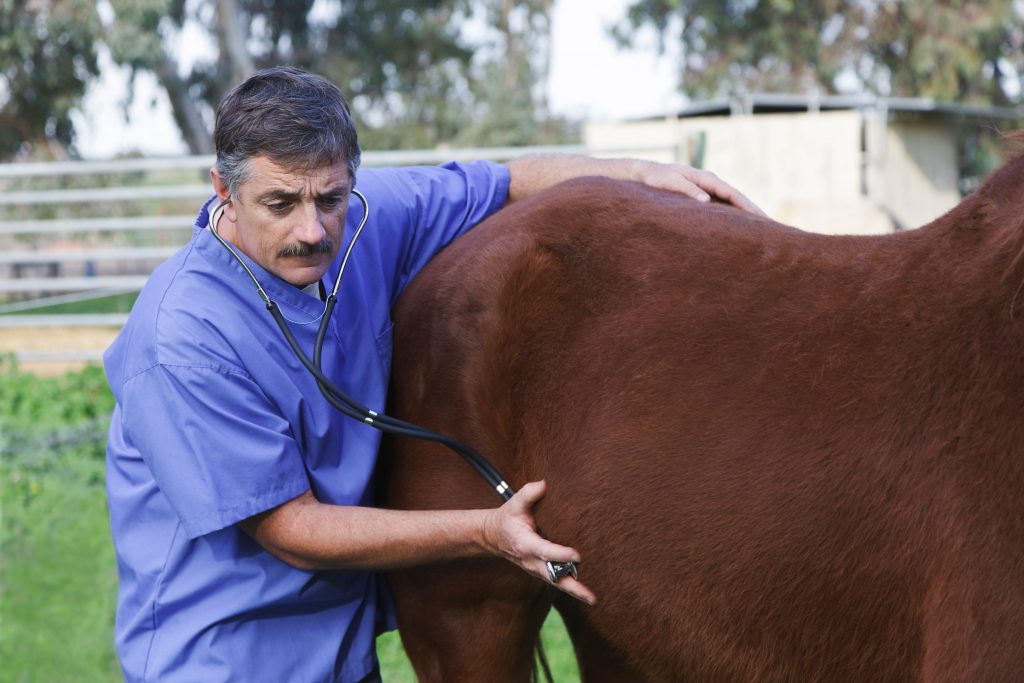‘Will we compete again?’ Statistics favorable following colic surgery
- November 12, 2025
- ⎯ Fran Jurga
[Note: This article was originally published on March 6, 2017.] “Will he ever be the same? Can he jump again?” How many horse owners have asked those questions, often in the middle of the night, when a veterinarian delivers the news that potentially complicated (and expensive) interventional abdominal surgery is needed to resolve a horse’s colic pain—and possibly save his life?

Maybe you’ve been there. You’ve hauled your horse to a surgery-equipped vet clinic or university hospital. You might even have hoped that a bump in the road helped move along the painful symptoms of intestinal displacement or blockage. You wonder how serious it is this time.
And when the veterinarian returns from examining the horse, you find out that surgery is recommended. You feel your credit card smoking in your backpack.
The next time you see your horse, he’s wearing a belly bandage. His latest tack is an IV catheter. He’s still sedated. And he’s a shadow of his usual self.
Bigger, brighter picture
Given all the advances in colic diagnosis and surgery, the answers should have been easier for veterinarians, but numbers can be hard to find. The most important numbers are the ones relative to your veterinary clinic’s surgical successes, and any relevant criteria for your horse, like age and medical history and condition.
Last week, a new study from Finland helped paint a bigger, brighter picture for owner decision-making. A number-crunching study funded by the American animal health charity Morris Animal Foundation shows that colic surgery results in overwhelmingly positive outcomes for both horses and owners.
Still a risk
Colic, defined as abdominal pain, affects between four and 10 percent of horses during their lifetimes. It is a serious and sometimes life-threatening condition.
First, it should be noted that colic surgery is still a risk for horses. In the study, 82.6% (195/236) survived the surgery. However, that translates to more than one in 10 who did not survive. Post-surgical complications are another consideration. That said, 74.9% (146 of 195 surgery-surviving horses) were successfully discharged after recovering from surgery.
“Many horses encounter colic at some point of their life and, fortunately, many of the episodes can be treated conservatively with medication and fluids,” said Dr. Isa Immonen, University of Helsinki, Finland, one of the paper’s authors. “Sometimes, however, the horse requires surgical treatment, which is expensive and a major operation for the horse. This may be a difficult life-and-death decision for the owner.”
Long-term outcomes
Researchers looked at the long-term outcomes of 236 horses undergoing surgery for colic between 2006 and 2012. The focus was on owner satisfaction and patient performance after surgery. The team found that, of the horses that survived to hospital discharge, 83.7 percent returned to their previous or intended activity. And 78.5 percent regained their pre-surgical or higher level of performance.
The team also found a high level (96.3 percent) of owners were satisfied with their veterinary care. In addition, “nearly all (98.5 percent) evaluated the recovery after the colic surgery as satisfactory or above.”
“We felt that defining the factors affecting the prognosis and postoperative performance could give answers that would help both the owners and the veterinarians in the decision-making process—whether to operate or not—specially when focusing on the meaningful long-term life and use of the horse after colic surgery,” said Dr. Immonen.
Never be complacent
The bottom line for horse owners is to never be complacent that a colic case can simply be fixed by surgery. Colic is a serious and life-threatening health condition. But if surgery is an option and the horse survives both the surgery and the post-operative recovery, the future looks promising. An athletic horse may well return to form, potentially at the level attained before the surgery.
Dr. Immonen received funding through MAF’s Veterinary Student Scholar program. The grant-based program provides veterinary students the opportunity to become involved in mentored research that advances the health and/or welfare of companion animals and wildlife. The program is open to students from all over the world through a competitive application process. It has led many of the Foundation’s former student scholars to pursue careers in veterinary research.
Link to download the full study: http://actavetscand.biomedcentral.com/articles/10.1186/s13028-016-0273-9
Also see: Groundbreaking Equine Colic Research Project: First Study Results Published (2015).





